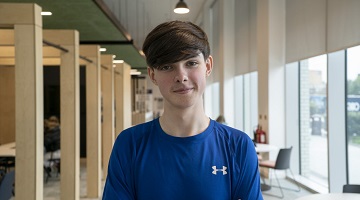Communication, Cultural and Media Studies Research Group
Learn more about the work our Research Group undertakes
The Group’s aim is to analyse the content, operation and impact of the media and new technologies including new media, immersive media and social media, as well as the role of culture and identity in shaping public policy at local, national and international levels.
Research from the Communication, Cultural and Media Studies Research Group is hugely varied and falls into two thematic clusters with several core themes below.
1. Journalism, Media and Communication
- Use of new and emerging technologies in business, education and society
- Film, documentary, and film-making
- Reporting death, trauma and war
2. Culture, Identity and Policy
- Identity discourse, security and peace
- Tourism, travel, culture and heritage
- Music, ethnomusicology and identity
- Culture, society and sports
- Age, gender and sexuality
The work from the Communication, Cultural and Media Studies Research Group draws on the relevant research specialisms across three Faculties (Faculty of Arts, Professional and Social Studies, Faculty of Business and Law, Faculty of Science) and five Schools (Liverpool Screen School, School of Humanities and Social Science, School of Education, Liverpool Business School, School of Sport and Exercise Sciences), bringing together a diverse community of researchers, which helps promote interdisciplinarity.
There are important synergies and interactions among the research clusters, which also works closely with two research institutes centred in the Faculty of Arts, Professional and Social Studies: the Institute for Cultural Capital and the Institute of Art and Technology, Liverpool’s international flagship entities for cultural and creative research.
The research within the Group includes both theoretical and traditional research and practice-based research, such as immersive 360-degree documentary, documentary films, radio programmes, and performance of adaptation for stage.
In the 2021 research assessment exercise (Research Excellence Framework 2021), 54% of the research submitted by the Communication, Cultural and Media Studies Research Group was rated as world-leading (4*) or internationally excellent (3*) in terms of its originality, significance and rigour, whilst the remaining 46% was rated as internationally or nationally recognised. Furthermore, 33% of the Impact Case Studies submitted for assessment was judged as having outstanding impact (4*) or very considerable impact (3*) in terms of their reach and significance.
For the REF2021 cycle, the size and research expertise of each cluster within the Research Group have expanded considerably. The total number of staff submitted to the REF has increased from 13 in 2013 to 32 in 2020.
Over the past few years, the Group has made considerable advances in facilitating and developing multidisciplinary, interdisciplinary, international research and collaboration with a wide range of external partners in the UK and around the world. This vibrant and dynamic research environment has resulted in the production of high-quality research outputs with significant impact nationally and internationally, increased generation of external funding and a growing postgraduate research community.
An important area of collaborative research led by Professor Rachel McLean is the impact of new technologies on society. Professor McLean was voted by the members of the UK Academy for Information Systems (UKAIS) to the position of President Elect in 2015. She took up the role of President in 2016-2018 as the first woman to hold this office in twenty-one years of UKAIS. In recognition of her research expertise and status, Professor McLean has been appointed a sub-Panel member for REF2021 (UoA34).
A major interdisciplinary collaborative initiative from this Research Group is the East Asian Security and Peace Project led by Professor Rex Li, which analyses the role of identity in shaping foreign policy discourse and security relations in East Asia. Funded by Riksbankens Jubileumsfond (Swedish Foundation for Humanities and Social Science), this project is linked to a £2.3 million research programme based in Sweden, involving a multidisciplinary team of scholars from a wide range of academic disciplines in Europe, Asia, and the United States.
Another significant research project derives from Professor Peter Millward’s British Academy Mid-Career Fellowship award ‘Exploring Supporter-Activism in Identity Politics-Centred Social Movements: A Cultural Relational Sociology Analysis of the European LGBTI+ Football Fans’ Network’ (2019-2020, £139,337). Funded by the European Commission under the ERASMUS+ Sport Programme (€78,850), Professor Millward’s multidisciplinary collaboration with European scholars has produced important recommendations on tackling homophobia and promoting anti-discrimination around major sports events.
Some researchers from the Group are involved with the Liverpool Film Seminar Series. Led by Dr Lydia Papadimitriou, this is a collaborative project with the University of Liverpool that provides a forum for Merseyside scholars and postgraduate students to exchange ideas, network and promote high-quality research within film studies. Many prominent international scholars have presented their research at the seminar series. The seminars have offered new insights into film research and facilitated international collaboration.
Another important interdisciplinary project led by Dr Hazel Andrews focuses on Brexit and tourism, which has resulted in a major book publication in 2020. This international project considers how the COVID-19 pandemic has converged with tourism and Brexit to shed light on the meanings and practices of travel, borders and identity. Dr Andrews has brought together a range of scholars from the UK, EU, USA, Australia and New Zealand to reflect through the lens of tourism and Brexit on key issues in the social world. It is the first study to consider the intersections of tourism, Brexit and COVID-19.
Other notable interdisciplinary projects include Dr Sara Parker’s British Academy GCRF grant on ‘Dignity Without Danger: Collaboratively Analysing Stigma and Taboos to Develop Innovative Strategies to Address Menstrual Exclusion in Nepal’ (2018-2020, £300,000); Dr Kerry Wilson’s AHRC-funded Leadership Fellowship (mid-career) ‘Instrumental Values: Professional Ethics in Collaborative Cultural Work’ (£114,140, 2017-2019); and Professor David Chalcraft’s British Academy International Mobility and Partnership grant on ‘Developing Biblical Ethnography in India and the UK’ (2013-2016, £30,000).
The staff within this Research Group have embedded engagement and impact in their research, and used their networks to develop extensive links with non-academic users in the UK and internationally.
For example, Professor Rex Li’s research on identity and security has had considerable impact on the policy and diplomatic communities in the UK, Europe and Asia. He has been regularly invited to speak to high-level policy audiences and at international affairs think-tanks in various countries, such as Royal United Services Institute for Defence and Security Studies (UK), International Institute for Strategic Studies (UK and Singapore), European Institute for Asian Studies (Belgium), Swedish Institute of International Affairs (Sweden), Institute of International Relations of Peking University (China), Academia Sinica (Taiwan), and Diplomatic Academy of Vietnam (Vietnam).
Professor Simon Piasecki’s adaptation of Flight to Arras deploys a second-world war account by the author Antoine De Sainte-Exupéry to discuss contemporary concerns relating to the mass flight of refugees across Europe. The performance of the adaptation was shown in the UK, France and Armenia. Professor Piasecki was invited to give a presentation to the EU Parliament concerning the work for the World Refugee Day 2018, which framed a policy debate in its ‘Promoting Peace: Creating a Welcoming Europe’ roundtable event.
Chris Chadwick’s international project ‘Racing the King Tide’ has influenced policy change at local and national Philippine government level in terms of adaptation to sea level rise and community migration. His immersive 360-degree documentary has had significant impact on reframing the international debate on sea level rise and the UN’s intervention in this policy area. The films have been played at various prestigious International Conferences on Coastal Engineering. The research is successful in shaping the views of leading coastal planners and engineers about climate change adaptation. His work also pushes the boundaries of filming using cutting-edge technology.
Another example is Dr Michael Brown’s documentary film that gives a portrait of Nepal’s working mules. His film has been used to create positive change in the wellbeing of Nepal’s working mules. This documentary was the winner of several prestigious film awards in Europe and America. It was screened in Russia and broadcast on a satellite TV station in Nepal reaching across South Asia.
Dr Helen Tookey’s project on the writer Malcolm Lowry has raised the profile of Lowry as a writer born on Merseyside, resulting in the installation of a blue heritage plaque in his birthplace, New Brighton, in 2019. The project has made Lowry’s life and works accessible to new audiences through a wide range of public activities, including guided local walks, illustrated talks, film screenings, a conference, and new artistic commissions. It has helped inform and develop Bluecoat’s strategic approach to presenting contemporary art.
Faq Items
Core Members of the Research Group
Associate Members of the Research Group
Contact details
Contact the Communication, Cultural and Media Studies Research Group
If you would like to find out more about this Group or explore possibilities for research collaboration, please contact us using the details below.
Contact: Professor Rex Li, Professor of International Relations
Research Coordinator, Communication, Cultural and Media Studies Research Group
Call: +44 (0)151 231 4836
Email: r.y.li@ljmu.ac.uk
Address:
Faculty of Arts, Professional and Social Studies
Liverpool John Moores University
Redmonds Building
Brownlow Hill
Liverpool
L3 5UG
United Kingdom




